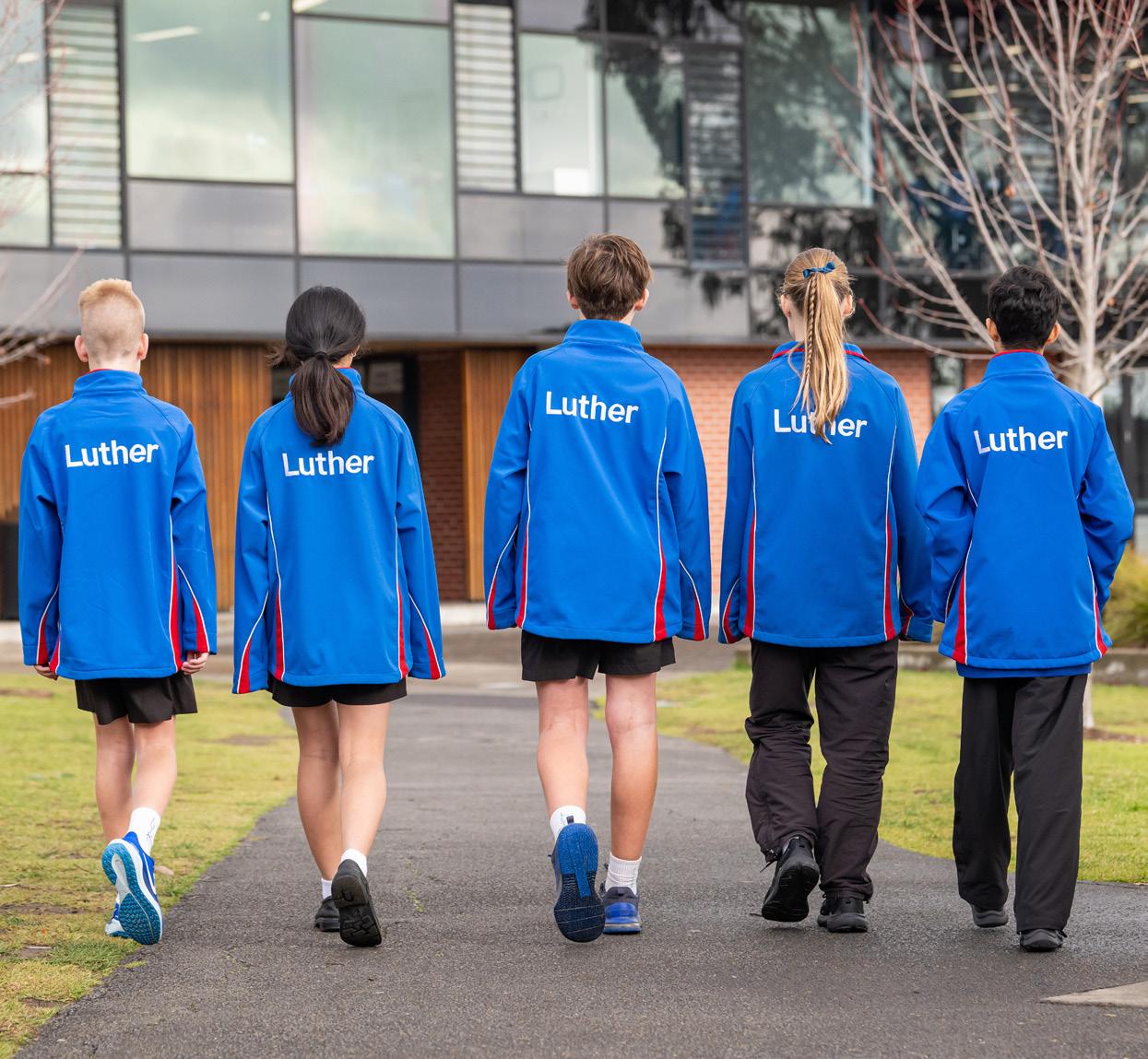

Growing up is hard to do…
Find your people, find your focus, find your voice
Growing up is hard to do….
Find your people, find your focus, find your voice.
Rhiannon Ward Head of Research and Development
Find your people
With a sizzle underfoot, sweat on our brows and a sprint across the bitumen, these three essentials were the start of any good school lunch hour in the summer sun of the 1990s. As that 1pm bell rang, we would burst from the portables in a flurry of lunchboxes and wide brimmed hats. The year was 1990; I was in Grade 3 and Sid the Seagull’s infamous ‘Slip, Slop, Slap’ campaign was in every parent’s and teacher’s periphery during these shimmering hot spells. At the start of lunch, the aim was to get as quickly across the blazing asphalt courts as possible, and into the cool scrub of the Magic Forest. Here, the melaleuca gums offered us reprieve from the scorching sun, and a chance to shake off the classroom and shake on the joys of play. 40-40 was all the rage…. darting around climbing equipment, hiding behind fallen logs, fiercely dashing across the sandpit to boldly ‘4040 save all!’. I don’t remember every little detail of those games – who won on which day, or where the best hiding spots could be found, but what has resonated with me to this day is the sense of belonging that could be found underneath those trees. Some of my strongest primary school friendships were forged in that Magic Forest, and all because we had a common goal, a shared interest, an instant connection. In my upper primary years, I do recall steering away from the bluster of the games, and retreating deeper into the forest, to the Secret Log. Here, my Grade 6 friends and I would meet to share our tween-heartbreaks, or concerns, or crushes. But these friends had first formed within those fast and furious 40-40 days, and the connecting factor was our shared identity. We were the 40-40 Fighters, and that said everything.

We all know that friendship is important, and as social creatures, humans are hardwired to seek companionship and connection over the course of our lives. When babies are born, they are scooped onto their mother’s chest for the well-established ‘skin to skin contact’ as the first connection point between mother and child outside of the womb, (August 2024). As children grow, we often pick them up and cuddle them, or sling them over a hip, or drop them onto our shoulders, as a physical reminder of our love and influence. As these children progress into their teenage years, this contact becomes something else again; a hug when things are feeling hard, or a playful fist pump when success has just landed at their feet. In our own relationships with other adults, we may give our close friends a brief squeeze when we see them, as a reminder of our friendship. People are communal animals, and friendships are essential.
Friends can reassure us when we are feeling uncertain and can reaffirm us when we seek guidance. Friends can boost our mood, increase our happiness and offer emotional support. They create our personal history through shared connections and experiences. If you can recall some of your own relationships, usually these are punctuated by a series of key moments or lived stories. When you catch up with these old friends, you likely often hear yourself reminiscing, ‘Remember that time your car broke down on the West Gate Freeway and it was 35 degrees!’, or ‘How crazy was that camping trip when a storm ripped through and your tent didn’t make it home!’, or ‘That trip to Bali was just my favourite experience yet…!’. Good friends give us joy, they give us validation, and they give us hope. But choosing friends and forming these threads takes time, and it can be hard for young people to pry themselves away from screens and log
themselves into real life. It is true that some people find making friends an easier task than others, and some people seek out multiple different circles whilst others are more satisfied by just one or two close connections. So how can we support the growth of positive friendships in our children and students? And how can we offer support when these peer connections sour? Let’s take a closer look……
The Loneliness Epidemic
We are in the midst of one of the most confusing periods in history, where children’s free play has been minimised at the intersection when their screen time has largely increased. Thirty or forty years ago, we were sent outside on our bikes to roam the neighbourhood from as young as nine or ten years of age. Now, parents wouldn’t dream of doing this without a phone or smart watch connected mightily to their minor’s wrist. The depletion of unstructured activity and the increase in phone-based recreation led social researcher Jonathan Haidt to label this ‘Anxious Generation’ as being “overprotect(ed)…in the real world while underprotect(ed)… in the virtual world”, (Haidt, 2024). Haidt’s work articulates that this decrease in unplanned social interaction has fundamentally led to the decline of child and adolescent mental health in the past 10-15 years, with statistics proving a sharp increase in the number of young people being diagnosed with serious mental illnesses such as anxiety, depression and even ADHD, as can be noticed in the graphic below.
This diversion away from the sunshine and onto the screen has also been identified as the launching pad for loneliness that is sweeping through our young people today. Certainly, we have had trigger points in our relatively recent life history such as lockdowns, which prevented natural human interaction and forced many people into lives of isolation. However, long-term research has indicated that typically, people in the 18-22 age range report
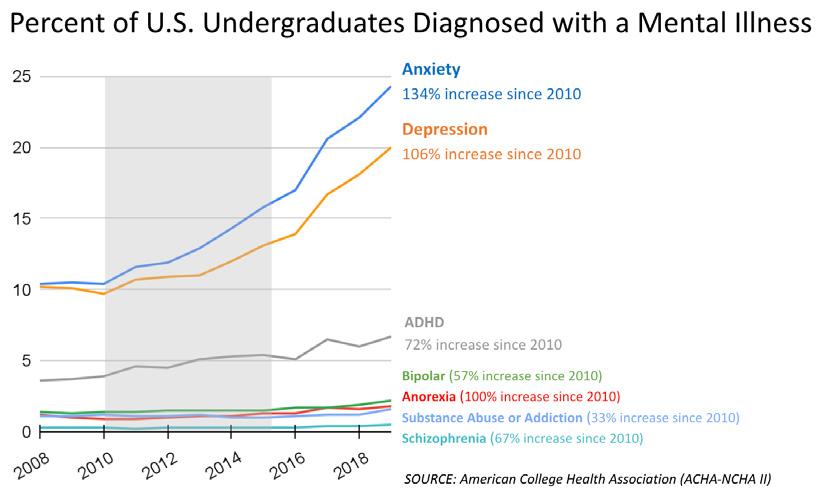
Source: Haidt, J., website
the highest levels of feeling lonely, with those aged between 55-73 recording the lowest feelings of disconnection (Elseiver, 2023). This same research concluded that increased social media use and decreased real- life human interaction, can be attributed to the cause for this spike in our youth. These feelings of loneliness were more common among people with high levels of social media engagement, and furthermore, children under the age of 18 are reporting that they feel a ‘crisis of connection’ with up to ‘one in four young men…(believing) they have no close friends’, (Swann., R., 2024). There is some research to suggest that boys struggle slightly more than girls as they are prone to internalising emotions, whereas girls tend to develop more varied social networks. In juxtaposition, the older generations are far more accustomed to meeting people and making friends the ‘old-fashioned way’….at work, or at university, or in our broader networks. These ‘over 55’s’ were good at making a web of friends; they smiled, made eye contact, and worked hard at building these human connections. They invited people over for dinner or suggested joining activities that were of a shared interest, such as walking, or bowling, or reading groups. This generation never dated online, swiped left or right to make a connection, or snapchatted almost strangers because they were a friend of a friend and seemed like fun. The arrival of the smartphone has most certainly changed the
yardstick for our relationships, and it is our job as parents and teachers to show our children what we know, and optimise opportunities for unstructured, real-life social play.
Tips and tricks to help your teen
When friendships are formed, we are often as thrilled by these connections as our children, and whilst the friendships are in bloom, these can be some of the sunniest times for our teens. However, as children grow, develop and change, friendships can come and go, and this is ok. In fact, this is a natural part of growing up, as we get to know ourselves more and our priorities change, so can our friendships. As the children in our lives navigate these changing seasons, it becomes our job as the adults to offer support and guidance when things become wintery. When a friendship sours, this process can be a very difficult thing to navigate from afar, and so in helping your teen through these shifts, remember to lend an ear, really listen, and offer positive reinforcement to build resilience, rather than madly try to fix their problems for them, as this graphic outlines:
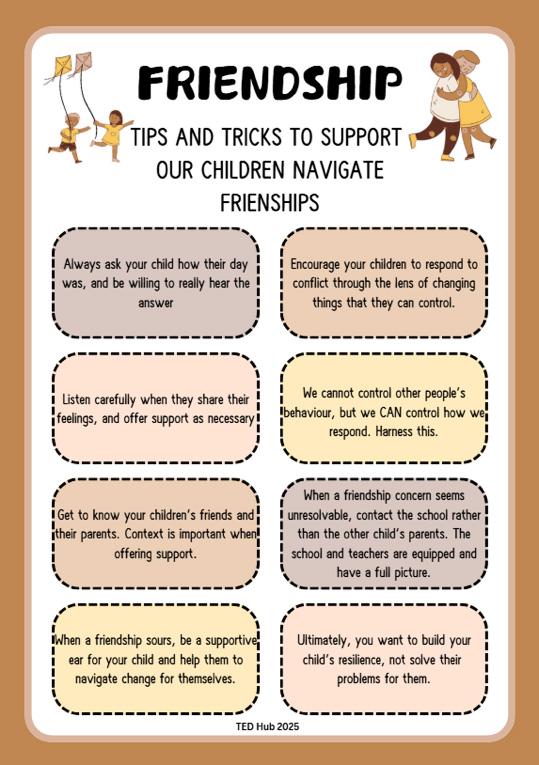
We must guide our children to be the friendly face in the playground who smiles at another child who is sitting all alone. We must insist that our children are inclusive, embracing everyone from their social circle and not leaving people out unnecessarily. We must teach our children this message: that being kind is being strong, and not to fear the repercussions of put downs when they are bold enough to be the upstander. Luther College Chaplain, Simone Turner, in fact opened Term 3 with this message, and she insists that, ‘every person matters, not because of what they do or achieve, but because of who they are. When we teach our children to build a community that is inclusive, embracing and kind, we affirm the shared truth that we are all human, each worthy of being seen, valued and loved. This is the kind of community that truly makes a difference’, and this is the kind of community that we try to foster here at Luther College (Turner, S., 2025).
Luther College | Growing up is hard to do… - Find your people, find your focus, find your voice.
Find your focus
Trying new things can build social networks
It is true that we learn by association, that we mirror the attributes of those around us. The social psychology behind this is simple, really; it is our ‘brains secret handshake’ that says, ‘I am with you, I am one of you, I am like you’, (NeuroLaunch, 2024). On a chemical level, when we see others behave in a similar manner to ourselves, our brain registers this as comforting, and it is reassured. This primitive reaction would have been a survival mechanism back in our caveman days, and our basal ganglia has not evolved much since then, (2021).
By extension, this means that if we are to live happy and fulfilled lives, we should surround ourselves with people who share our values, share our interests, and share our world views. If we are all running about playing this ‘giant game of Simon Says’, (NeuroLaunch 2024), we want to be doing good for the world, and not harm. As such, it is vital that we teach our children the skills involved in selecting healthy friendships, as a lot of what they see and do out there will come funnelling back inside our own living rooms. Whilst we may wish that we could choose our children’s friends, the older they become, the harder it is to track their social associations. But that is ok, and I am not suggesting that you manage their phone contact list and veto anyone who you think is on the nose, but rather I am suggesting that you have meaningful conversations around your dinner table about friends and the qualities of good friendships. We have placed a lot of focus on this in our Home Groups at Luther College this year, with Wellbeing Weeks being a spotlight of the morning routine. Our Director of Pastoral Care and Wellbeing, Rik Malone, has leaned to Melbourne paediatrician, Billy Garvey, author of ‘Ten things I wish you knew about your child’s mental health’ (Garvey, B., (2024), for reflection. Here, Garvey ‘argues that social skills and emotional development are the biggest predictor of lifelong success in terms of mental health, self-esteem and relationships. Garvey believes that the key social skill is empathy because it is about connection,’ (Malone, R., 2025). Our Home Group and pastoral program pay close attention to these points of connection for our students, and we facilitate these experiences each and every day.
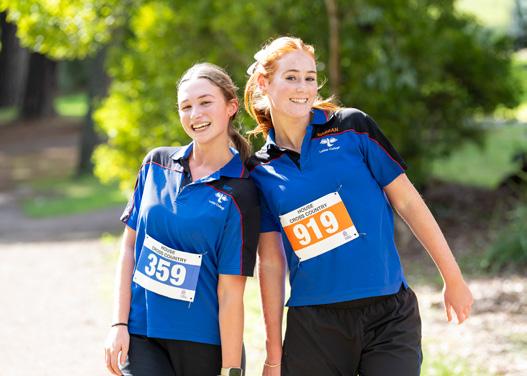
Our Heads of House work in unison with Home Group Mentors to build a strong program that promotes friendship, with Head of Cheong House Julieanne Hughes believing that friendships are important “as they give students a sense of connection and acceptance. Friendships sometimes challenge us, however they also allow us to grow and reflect. Friendships provide us with an opportunity to sharpen our listening and communication abilities whilst creating memories that enrich our lives”, (Hughes, J., 2025). Similarly, Acting Head of Warran House, Rohan Ware, explains that ‘friendships can take many different forms and all have their purpose. However, the strong friendships and deep connections you make, with those people who just get you, provide us with countless benefits to our mental to physical health. They give us connection, a sense of belonging and help shape the people we become’. (Ware, R., 2025).
Whilst connection is a resonating thread, on the other side of the coin, when friendships shift and the season cools, this can be a challenging time for young people. All of a sudden, they might feel excluded, or misunderstood, or different. They might feel like they have not found ‘their people’, or they are no longer aligning with the interests of the others in their group. It is important for us to guide and support students in these moments of distress, and ultimately, steer our children in the direction of authenticity. Head of Yarra House, Chloe Timms, feels that friendship shifts can be difficult for students to navigate. Timms and her Home Group Mentors support their students through “these challenging situations by…understanding how painful and big a friendship breakdown can be. Students feel listened to and their feelings (are seen as) valid. To move forward, (by) asking students what they valued in the friendship, and what they might look for in future friendships, can help them move on and find new connections with others” (Timms, C., 2025).
Friendships form our foundation, and it is important to invest energy into these communities. Being true to ourselves, our core, our values is important, and it is important that we boost this message in our households and develop in our children this strength of resolve.
Find your voice
Sometimes being different is the best thing to do
As we grow and change with time, it is only natural that our friendships and connections evolve along with our own metamorphosis. Infamous Irish poet, playwright and author Oscar Wilde, is revered for saying ‘be yourself, everyone else is already taken’, and this message holds resonance for all of us living today. It is a reminder of our own uniqueness, our own special gifts and talents, and our own fresh perspectives. Here at Luther College we often hear the message that ‘we are loved’. We are reminded that we are enough, right now and in this moment, and that Grace is freely given regardless of our actions. If we are worthy of such unconditional acceptance, then so is everyone else - which means people deserve the freedom to grow, explore, and experience life authentically.
As life takes us on our journey, we need to give our children the voice to be bold, to be different, to be themselves. You never know who you might find along the way. In a similar manner, we must remind our children of the strength in being the upstander; to stand up for what you believe, even if this is not popular. By voicing what you know to be true, and for having the strength to stand by your resolve, you will find your people and they will respect your integrity.
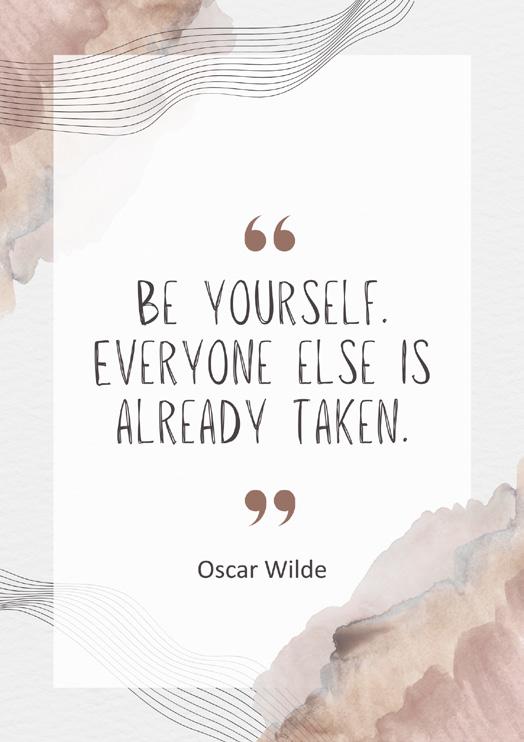
Ultimately, the world can be a hard and cruel place, so it is our job as teachers and parents to model positive relationships for our children. We should be kind and treat others as we wish to be treated. We should be inclusive and show our friends and family respect and generosity of spirit. We should be available with our time, our heads and our hearts. We should reflect to our children these positive adult friendships, so that they have something to mirror back to us in due course. And so, as our children move through the seasons of their lives and their friendships shift and change, we must harness our inner-Oscar Wilde, cheer on our children from the sidelines, and ultimately, buckle up for the greatest ride of our lives; raising children today.
References
Garvey, B., (2024) Ten things I wish you knew about your child’s mental health, published by Penguin.
Haidt, J., (2024), The Anxious Generation: How the Great Rewiring of Childhood is Causing an Epidemic of Mental Illness. Penguin Random House.
Haidt, J., website. Retrieved online: The Anxious Generation | Jonathan Haidt
Hughes, J., (2025), Head of Cheong House, Luther College.
Interaction Design Foundation, (2021), Our Three Brains - The Reptilian Brain. Interaction Design Foundation. Retrieved online: Our Three Brains - The Reptilian Brain | IxDF
Junior, I., (2025), The Power of Friendship, retrieved online: 21 Importance of friends in Life - The Power of Friendship | Lifeimpactful
Malone., R., (2025) Director of Pastoral Care and Wellbeing, Luther College.
NeuroLaunch Editors, (2024), Mimicking Behaviour in Psychology: The Science Behind Why We Copy Others. Retrieved online: The Psychology of Mimicking Behavior: Why We Copy
The Author(s), (2023), Editorial, The epidemic of Loneliness. Published by Elsevier Ltd, The Lancet, Volume 66. Retrieved online: *The epidemic of loneliness
The Royal Hospital for Women, (August 2024), retrieved online: Skin to Skin with your baby at birth.pdf
Timms, C., (2025) Head of Yarra House, Luther College.
Turner, S., (2025), Chaplain, Luther College.
SuperCamp, retrieved online: Be Yourself – Everyone Else is Already Taken 2
Swann., R., (2024), Helping Boys Deal with Loneliness, Positive Masculinity Foundation, retrieved online: Helping Boys Deal With Loneliness
Walker, H., Maitland, C., Tabbakh, T., Preston, P., Wakefield, M., and Sinclair, C., (2022). Forty Years of Slip! Slop! Slap! A call to action on skin cancer prevention for Australia. Published for Public Health Research and Practice, retrieved online: PHRP31452117
Luther College
Plymouth Road
Croydon Hills Vic 3136
Phone: (03) 9724 2000
www.luther.vic.edu.au
